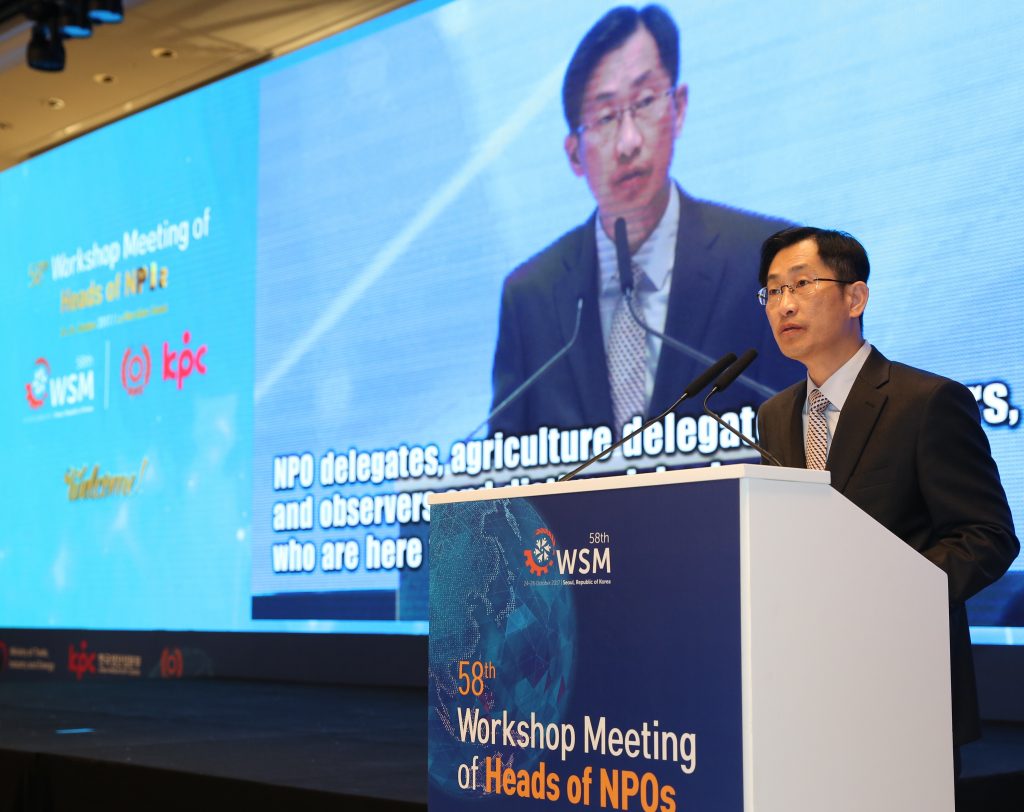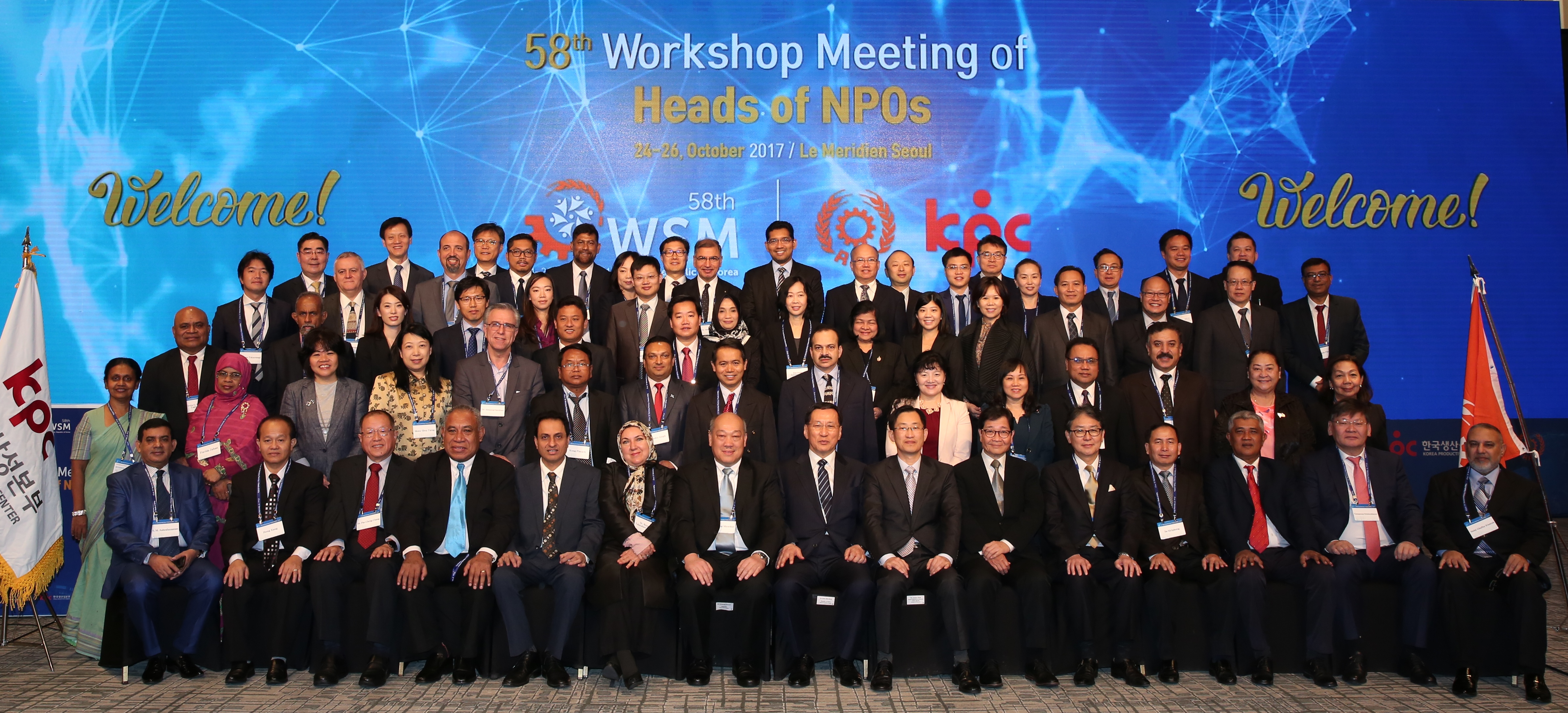
Select Page

The Asian Productivity Organization (APO) concluded its 58th Workshop Meeting (WSM) of Heads of National Productivity Organizations (NPOs) in Seoul, Republic of Korea (ROK), 24–26 October 2017. The 58th WSM was attended by 18 NPO delegates, 15 Agriculture delegates, and 17 advisers; and observers from the Centre on Integrated Rural Development for Asia and the Pacific and Romanian Ministry of Business, Commerce and Entrepreneurship and Ministry of Regional Development.

ROK Deputy Minister for Industrial Policy, Ministry of Trade, Industry and Energy Dr. Gunsu Park delivering the inaugural address at the opening session of the 58th Workshop Meeting of Heads of NPOs in Seoul, Republic of Korea, 24 October 2017.
The WSM is the annual strategic planning meeting where APO member countries deliberate on the biennial program plan and review initiatives to ensure that they respond effectively to the needs of their economies. A current key APO focus area is building the capacity of member countries for strategic foresight planning, enabling them to anticipate changes in the dynamic global environment.ROK Deputy Minister for Industrial Policy, Ministry of Trade, Industry and Energy, Dr. Gunsu Park graced the WSM as its guest of honor. Delivering the inaugural address, Dr. Park stated that the adoption of recent technologies like the Internet of Things, big data, and artificial intelligence (AI) had transformed facets of productivity enhancement. “It has become more common for productivity enhancement to significantly enhance value added through new services such as preemptive responses as accuracy in predictability increases, while maximizing efficiency in individual input factors,” he said.
Emphasizing that the role of the APO and NPOs had become more important than ever before for the seamless spread of the 4th Industrial Revolution throughout Asia, including the ROK, as well as to achieve productivity enhancement and economic growth, the Deputy Minister pointed out the need to create a new productivity paradigm befitting the upcoming era of superconnectivity or intelligence driven by the 4th Industrial Revolution.
Deputy Minister Park also highlighted the joint establishment of the Manufacturing Innovation 3.0 initiative by the government and private sector in 2013, before discussions on the 4th Industrial Revolution started. “This has initiated the industrial innovation movement to support productivity innovation by SMEs. Setting up smart factories through the convergence of manufacturing and ICT was a major achievement of the industry innovation movement. The concept had been applied to a total of 2,800 smart factories by the end of 2016, and the target is to support 20,000 companies by 2022,” the Deputy Minister reported.
Welcoming the WSM delegates, Korean Productivity Center (KPC) Chairman and CEO Dr. Soon Jick Hong said that the world was “standing at an inflection point in human history,” with advanced countries competing fiercely to dominate the 4th Industrial Revolution stage. “It is necessary for Korea and all APO member countries to take advantage of these changing times to take a leap forward,” he explained, while appreciating the APO’s contribution to expanding opportunities for cooperation and greater socioeconomic development of its members.
Presenting his report to delegates at the opening plenary session, APO Secretary-General Santhi Kanoktanaporn emphasized that the APO continued to remain on track to achieve the goals of the Roadmap to Achieve Vision 2020. However, he pointed out that with dramatic advances in technology shaping the economy of the future, there was a need for the APO to rethink how it could shape the national productivity agendas of member countries.
Highlighting the need for APO members to acquire foresight capabilities, Dr. Santhi reminded delegates that the disappearance of old jobs and the creation of new ones had been a constant since the birth of the modern economy, and the 4th Industrial Revolution would be no exception. “While it may be inconceivable that the technological revolution will leave no role for humans, we need to understand the key drivers of change well before the trends develop. Only then can we develop strategies to build flexibility into our policies to ensure that our economies are prepared for the transition to the digital economy,” he stressed.

58th WSM delegates.
WSM activities
The WSM agenda included adoption of the evaluation of 2016 projects and report on the APO Center of Excellence initiative, reconfirmation of the APO Program Plan for 2018, and Strategic Planning Sessions to deliberate on the new biennium program plan for 2019–2020. The WSM also reviewed programs to ensure that they responded effectively to the changing needs of member countries. Earlier in the day, Dr. Hong and NPO Delegate for Indonesia Kunjung Masehat were unanimously elected as Chair and Vice Chair of the 58th WSM, respectively. The WSM unanimously endorsed the documents and reference papers for submission to the 60th Session of the Governing Body scheduled to be held in Lao PDR in May 2018.
Two Strategic Planning Sessions were conducted to review in detail the lineup of projects for the industry and service sectors and that for the agriculture sector. NPO Delegate for the Philippines Dr. Elba S. Cruz chaired the session for the industry and service sector, while Agriculture Delegate for Fiji Jitendra Singh chaired the one for the agriculture sector. Both commenced with a presentation by the Secretariat on the strategic approach taken to develop the project lineups for 2018, 2019, and 2020. The delegates discussed and reconfirmed the hosting of projects as well as made minor adjustments.
The Secretariat explained the key features of APO programs and highlighted gaps due to the diverse nature of the economies of members. To close the gaps and address their needs, the Secretariat proposed the new Support to National Agendas on Productivity Program (SNP) with the objective of providing technical and financial assistance to NPOs or partner organizations for implementing projects that addressed the distinct needs of the NPO/country to enhance productivity and competitiveness. The Secretariat described the priority areas of the program and emphasized that projects under the SNP could not be supported under existing schemes.
The WSM deliberated on the SNP, with delegates seeking clarifications on its budget, evaluation and monitoring criteria, impact assessment, and how it could be better utilized to support member countries in meeting the emerging challenges arising from the digital and Industry 4.0 era.
Global conference
The 58th WSM was also unique in that unlike previous three-day deliberations, it followed a two-day format and concluded with a global conference organized by the KPC to mark its 60th anniversary. The conference on 4th Industrial Revolution and the Future of Productivity was attended by over 400 participants, including WSM delegates and executives from corporations like Amazon, Microsoft, NVIDIA, Samsung, and Fifth Era who shared their perspectives and experience of how technology was driving change and innovation. The speakers also described business strategies and solutions that could be used by both large and smaller companies in the transition to the Industry 4.0 era, digitally transforming their organizations to harness innovative trends and succeeding in the economy of the future.
Delivering the opening remarks at the conference, Dr. Hong stressed that the world was at a critical turning point of the 4th Industrial Revolution that was fast impacting society. “We have to pursue innovation-centered productivity enhancement that can maximizes output and help in value addition by leveraging newer technologies like AI and the Internet of Things, which, in turn, can lead to the overall economic growth,” he said.
Highlighting the role of the KPC in improving national productivity over the past 60 years by adopting advanced technologies and introducing new methods, he pledged that the organization would continue to focus on enabling companies to maximize the benefits of the technology revolution, in line with the government’s innovative growth policy: “We will spread core technologies of the 4th Industrial Revolution through the country’s SMEs to enhance the overall productivity of the economy.”
Congratulating the KPC on the 60th anniversary of its founding, Dr. Santhi said that the conference demonstrated its sustained commitment to developing excellence to tackle the challenges posed by the changing dynamics of the new-age economy. He stated that the KPC had demonstrated the APO spirit of mutual cooperation by organizing the conference along with the WSM to allow delegates from other member countries an opportunity to obtain a better grasp of the cutting-edge innovations that underpin productivity growth.
“In this era of digital transformation and technology-driven disruptions, we need to adopt new economic, productivity, and business models to shape the world and make our economies future-ready. This is also important from the policy aspect to implement lifelong learning initiatives that reskill the workforce and prepare it for the Industry 4.0 Revolution,” the Secretary-General noted.
Dr. Santhi also mentioned that the APO was promoting Sustainable Productivity to shape national productivity agendas and help member countries plan more effectively in an increasingly uncertain global business environment. “Sustainable Productivity is a new initiative led by the APO which leverages foresight as a strategic planning tool. Since it is impossible to predict the future, we should use foresight techniques to shape the future of productivity through concerted actions at organizational and national levels,” he explained.
Speaking on the changes in the productivity paradigm and resolutions for the future, Fifth Era Co-founder and Keiretsu Capital Managing Partner Matthew Le Merle said that the technology revolution was completely overpowering the global economy and there was a need to plan by keeping technology entrepreneurs and investors at the center. Le Merle advised governments to create conducive environments for technopreneurs and investors, including angel investors, so that they could reap the dividends of the Fifth Era or the technology-led Industrial Revolution.
Japan’s National Graduate Institute for Policy Studies Vice President Dr. Atsushi Sunami explained the progress of Abenomics and the concept of Society 5.0 promoted by the Government of Japan. He pointed out that Abenomics was shifting emphasis to stimulating innovation through science and technology related to the robotics revolution, AI, and 4th Industrial Revolution. Dr. Sunami explained Society 5.0 as characterized by finely differentiated social needs met by providing the necessary products and services in the required amounts, enabling all to receive high-quality services and live comfortable, vigorous lives with allowances for differences such as age, gender, region, or language. He stressed that the Japanese government was pursuing paradigm changes in industry, the economy, and society through disruptive technologies.
Photos: KPC